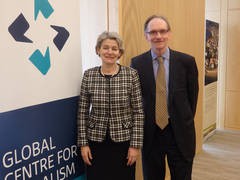
GCED Basic Search Form
Quick Search
Close
You are here
News
Irina Bokova In defense of Pluralism through Education
Post date:
2016/04/04

“What education do we need to build a more peaceful and sustainable future for all?” In a roundtable discussion at the Global Centre for Pluralism in Ottawa, UNESCO Director-General Irina Bokova outlined new approaches to living together in increasingly diverse and vulnerable societies.
Welcoming Ms Bokova, the Centre’s Secretary General, John McNee, affirmed that“finding ways of living together in diverse societies is one of the biggest challenges of the 21st century. If diversity is valued and accommodated, societies are more peaceful.”
The Director-General concurred that “violent extremism is one of the biggest threats to peace, security and living together. We have to understand the root causes and bring the full force of UNESCO’s mandate to bear in the response. More than ever we need to bridge cultures through dialogue on the basis of respect and understanding, we need to make the most of diversity.”
She affirmed that education - but not just any education - is one of the most powerful tools for countering violent extremism, while cultural heritage offers a formidable channel to promote diversity and common understanding. She stressed the need for new approaches and mindsets to empower youth with skills for critical thinking, with cultural competences and opportunities for civic engagement.
She outlined UNESCO’s action to promote education for global citizenship and prevent violent extremism, citing two global forums, with the third to be held in Ottawa in 2017, and the forthcoming launch of a teachers’ guide.
An animated discussion focused how to strengthen the forces of pluralism and make it work in practice.
Mr Khalil Shariff, Chief Executive Officer of the Aga Khan Foundation Canada, pleaded for a “bifocal vision” on education that prepares young people for the job market and to play their role in democracies. Multilingualism,
the role of education in reconciliation, new trends in teaching and learning and the sharing of best practices, including in the integration of refugees, were among the topics raised by representatives from government, NGOs and the education community.
The Centre for Global Pluralism is the result of a partnership between the Government of Canada and His Highness the Aga Khan, to advance the vision of diverse and plural societies.
URL:
http://www.unesco.org/new/en/media-services/single-view/news/irina_bokova_in_defense_of_pluralism_through_education/#.VwH94PmLSUk
